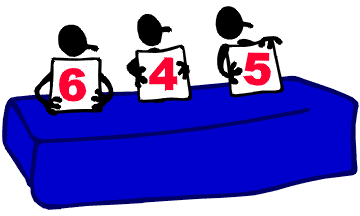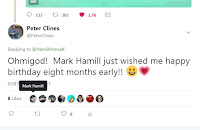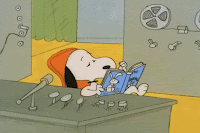Before we dive fully into the gift-giving season, I thought it might be a good time to talk about something that it might be… well, a little rude to ask for. It can be forward under the best of circumstances, and even more so with someone you barely know.
What? No, not that. Get you mind out of the gutter.
These days it’s easy to get in touch with people. Especially famous (and semi-famous) people. Social media. DMs. Email. Appearances. And I think we’ve all had that moment when someone we like or admire has favored us with a like, a response, maybe even a follow. Yeah, it’s just social media, but I think most of us get a little thrill from these moments.
That said, we also need to be honest about what these relationships are. Joe Hill retweeted me once, but I don’t think we’re best friends or colleagues or anything like that. Leslie Jones, Diedrich Bader, and Tara Strong all follow me on Twitter, but I’m pretty sure it’s just because I’ve made each of them laugh once or thrice. That’s all it is and I know it. I shouldn’t expect anything from them. Or be asking for it.
And with that in mind, consider this. I’m just a higher-end-midlist author, but every two or three weeks, I’ll get contacted by a complete stranger or sort-of acquaintance, and asked if I can read a few chapters of their manuscript or maybe the final product for a blurb or, hey, who’s my editor at Random House or contact at Audible and is that Andy Weir in that picture with you? Do you have his email address? Many of these are polite. Some are… not as polite. A few are flat-out arrogant.
And it’s not just me. Other writers have told me tales of request (or demands) for help. Sometimes they’re quiet. Sometimes they’re awkwardly public.
Past of the problem here is the misunderstood idea that all writers must help less-successful ones. Under any circumstances. No matter what they’re being asked to do. Read a manuscript? Pass said manuscript on to your agent? Donate a kidney? This is your obligation as a writer once you’ve had any level of success. Countless guru-types push this idea, and spin it so the professional’s the one being rude or unreasonable if they don’t immediately leap to assist me (note that frequently, said guru is not the person who can help, even if I’m paying him). And because the internet makes it so easy, just spam every writer you can find contact info or a Twitter account for. Sure, I’ll annoy 999 people, but it’s all worth it if one might help me, right?
Right?
(Narrator–no, it is not)
This isn’t to say I—or any professional—won’t help other writers. I seriously love helping people. What do you think this blog is? I’ve got writer-friends who help me with projects and I’d gladly help any of them with theirs. I’ve done the Writer’s Coffeehouse for years now. A few folks have standing offers from me to read their hopefully-soon-to-be-finished manuscripts. I don’t think I’m out of the ordinary here, as writers go
But let’s put some of this in perspective. Writing is my full-time job. It’s how I pay for food, bills, the mortgage, everything. I work forty to fifty hours a week. Sometimes closer to sixty as deadlines (contractual and self-imposed) loom. I know a few professional writers who have unrelated full time jobs, and then they’re still putting in twenty or thirty hours writing on top of that. There’s also time on social media and *cough* writing blog posts. Plus, I already get sent stuff to read by editors, publicists, and my agent. That’s part of the job, too.
So—even on the very low end—we’re looking at a 55-60 hour work week. I don’t think that’s out of the ordinary for a professional writer. Heck, it might be even a bit sub-par, by the standards of some folks I know.
And when, as a more-or-less-stranger, I ask someone to just look at my manuscript, I’m asking them to cut into that time. To cut into the “this is how I make a living” time. Or to cut into their free time, instead. If I ask them to pass something on to my agent or editor, I’m telling them they’re nothing more than a conduit to me.
If I’m going to be that person asking you to give up some of your free time or expertise or experience… here’s a few tips on how to improve my odds. I’m not saying they’ll guarantee success, but—and I bet this is true for most writers—the more of these that apply to me the better.
I’m not asking for something I could find out on my own
When I started out, to get any writing information you had to dig through magazines, make phone calls, send request letters, then go dig through more magazines, make different phone calls, and send different letters. These days all of this information (and more) is available with a few keystrokes and a bit of thought. Honestly, the fact that we can all see this post means we all have access to Google, yes? If I want to make writing my career, part of the work is… well, doing the work.
I think a lot of time when this happens, people are looking for the “real” answers. They don’t want to know how to select an agent—they want to know the agent who has a direct line to Simon & Schuster and takes unsolicited submissions and always gets six figure advances and movies deals. Because there has to be one, right? All those big authors didn’t spend time in the junior leagues. They went straight to six-figure incomes and movie deals… just like I want to do.
I’m not putting them on the spot
With social media (and in the olden times, signings and cons and other such gatherings) it’s easy to speak with pros. It’s also easy to call them out and ask them something very publicly in front of a large audience. So it’s tempting to just ask for blurbs or reads right out in the open, giving them the chance to help me out and look good in front of everyone.
The catch is, this messes with a power dynamic. Said writers very rarely can say yes (for the reasons above and others), but being published and even semi-successful puts said writer “above” me. And now I’ve put them in the position of looking like they’re punching down when they say no to me. It’s a lose-lose that just makes everybody annoyed, so I just shouldn’t do it.
I’m literate
We’d probably have serious second thoughts about a doctor who thinks viruses are caused by aliens, a mechanic who says gremlins are why your car won’t start, or a lawyer who doesn’t seem to understand any aspect of the law. If someone’s trying to convince us they’re a professional, we expect them to show a basic understanding of their field. We definitely don’t want them displaying ignorance of it.
If I send a DM to pro-writer Phoebe full of weird references or txtspk or just tins of spooling mistakes and typos, I’m showing her I don’t know what I’m doing. I don’t know the basics of writing. And if I’m telling her I don’t know the basics right up front, why should I expect her to spend several hours wading through my manuscript? Or even part of it?
I’ve known them for several years
Just to be clear, if I’ve followed someone for two years on Twitter or Instagram, this doesn’t really mean I’ve known them for two years. This also holds true for being a regular podcast listener, a longtime fan, or saying hi and shaking hands three years ago at a convention. Sorry. Do you remember that guy you met at a con three years ago and then never spoke with again? No? Wouldn’t it be weird if he got in touch tomorrow and asked you to take a day or two off from work…?
We communicate on a regular basis
The key thing I need to remember here is we. Communication is a two-way street. Me spamming Phoebe with messages and responses through multiple channels does not count as communicating. Neither does elbowing into another conversation. Or just following someone on Twitter, Instagram, or TikTok.
Communication is talking. Back and forth. Conversations. Discussions. Usually about a multitude of topics that have nothing to do with writing. If I’ve never done that with someone, asking them to read 450 pages is a rough icebreaker.
I’ve lived with them
This should be self-explanatory. Not in the sense of “on the planet at the same time” or even “crashed on the couch for a week,” but more in the “sharing rent and chores around the kitchen for several months” way. After our months together in the same house/ apartment/ hostel, I shouldn’t feel too weird about asking Phoebe to take a quick look at something I wrote.
Unless… I really screwed her over on the last month’s rent or the security deposit. Or punched holes in the walls. Or was really loud while they were trying to sleep. If I’m not aware I was the nightmare roommate, that’s another whole issue I need to deal with.
I haven’t asked before
I think we’re all familiar with the idea of spam. Getting hit with ads and requests and offers again and again and again and again. I don’t want to come across that way, as the guy asking for favors again and again and again. Gets annoying quick, doesn’t it? I don’t want to be the guy pestering Phoebe until she says yes. Again, a bunch of other issues there I need to work on.
Also, with all the conditions and time limits I’ve mentioned above, it’s kind of arrogant to assume I’m going to get a second chance at this. I definitely don’t want to send off a manuscript with three mistakes in the first two pages. To quote a semi-famous musical, I don’t want to waste my shot, so I don’t want to take it until I’m sure I’m going to hit.
I actually want to hear what they have to say
This is the big one, and I’d guess it’s the reason a lot of writers end up reluctant to respond to these requests. If you’ve been following this little collection of rants for any amount of time you’re probably heard me talk about it before.
Lots of folks say they want feedback, but what they’re reallylooking for is to get back wild praise and promises their manuscript will be passed on and up to agents, editors, publishers, and whoever makes the big Hollywood movie deals. In my experience, not a lot of folks actually want to hear criticism of their work (even if it’s constructive). They just want to skip to the next step.
Reading takes time. Writing up notes and thoughts takes time. Honestly, if all I want is praise and a handoff, I’m wasting Phoebe’s time asking for feedback. And she’s a pro, so her time is worth money.
Y’see, Timmy, if a lot of these apply to me, I’m probably in a good place. Feel free to drop Phoebe a note. I’d be fine with someone who ticked a lot of these boxes contacting me. I’m sure most professionals would feel the same way.
If not… maybe I should reconsider that email or DM before hitting send. I don’t want to look bad or put someone in an awkward position. It’s just not worth it in the long run.
Next time, I’d like to talk about starting points.
Until then, go write.











